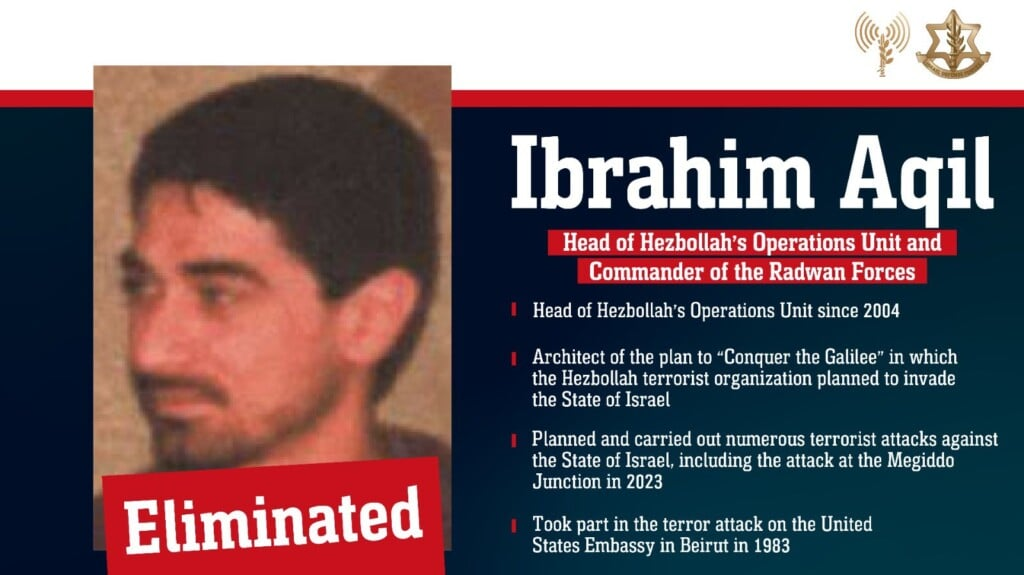
Latest Developments
An Israeli air strike on Beirut on September 20 eliminated Hezbollah’s top military commander, Ibrahim Aqil, and 10 other senior commanders belonging to the Iran-backed terrorist organization. Aqil’s death was confirmed by both the Israel Defense Forces and two “security sources in Lebanon” who spoke to the Reuters news agency. The strike came at the close of a week that plunged Hezbollah into disarray after thousands of pagers and hand-held devices carried by the group’s operatives detonated without warning on September 17 and 18.
Aqil was the second member of Hezbollah’s highest body, the Jihad Council, to be killed following an Israeli strike on the same area in July that eliminated his immediate predecessor, Fuad Shukr. According to the IDF, Aqil and the top brass of Hezbollah’s elite Radwan Force had been meeting beneath a residential building the Beirut suburb of Dahiyeh, a Hezbollah stronghold, when the strike took place. “They gathered underground, under a residential building, in the heart of the Dahiyeh, while using civilians as a human shield. They met to coordinate terror activities against Israeli civilians,” IDF Spokesman Rear Adm. Daniel Hagari said. Hagari added that Aqil and the Radwan commanders had been discussing a plan to carry out an invasion of Israel’s Galilee region reminiscent of the Hamas atrocities in southern Israel on October 7. “Hezbollah intended to raid Israeli territory, occupy the communities of the Galilee, and murder and kidnap Israeli citizens — similar to what Hamas did on October 7,” he said.
Expert Analysis
“Israel is steadily dismantling both Hezbollah’s command structure and its fighting force. The elimination of the top command of Hezbollah’s elite Radwan terror leadership, including chief operations commander Ibrahim Aqil — a veteran terrorist who participated in the 1983 bombings of both the U.S. Embassy and the U.S. Marine barracks in Beirut — is a particularly welcome development. Instead of distancing itself from Israel’s audacious operations, the Biden-Harris administration should recognize one obvious fact: The regional stability it craves can only come once Iran’s proxies, and the Islamic Republic itself, are decisively defeated and toppled.” — Mark Dubowitz, FDD CEO
“For months, Hezbollah has seemingly had the upper hand on the Israelis. However, Israel has managed to do the impossible and carry out significant strikes against Hezbollah, humbling its leader, Hassan Nasrallah, and his supporters. The Jewish state must leverage this rare opportunity to set forth a clear strategy against Hezbollah if it seeks to achieve its war goal of returning displaced citizens to their homes in northern Israel.” — Joe Truzman, Senior Research Analyst at FDD’s Long War Journal
Aqil Wanted by U.S. for 1983 Beirut Embassy and Marine Barracks Bombings
Aqil was a veteran terrorist who was wanted by the United States for his central role in the 1983 bombings of the U.S. Embassy in Beirut and the U.S. Marine Corps barracks in the Lebanese capital that took the lives of more than 300 people, including U.S. and French military personnel and diplomats as well as Lebanese civilians. On April 18, 2023 — the 40th anniversary of the U.S. Embassy bombing — the State Department’s Rewards for Justice program announced a $7 million reward for information on Aqil’s whereabouts.
Speaking following the elimination of Aqil and the other Radwan Force commanders, Israeli Defense Minister Yoav Gallant reiterated the Jewish state’s goal of returning the more than 60,000 Israels displaced by nearly one year of Hezbollah attacks safely to their homes. “Even in the Dahiyeh in Beirut, we will continue to pursue our enemy in order to protect our citizens,” Gallant said. “The sequence of operations in the new phase [of the war] will continue until our goal is achieved: The safe return of the residents of the north to their homes.”
